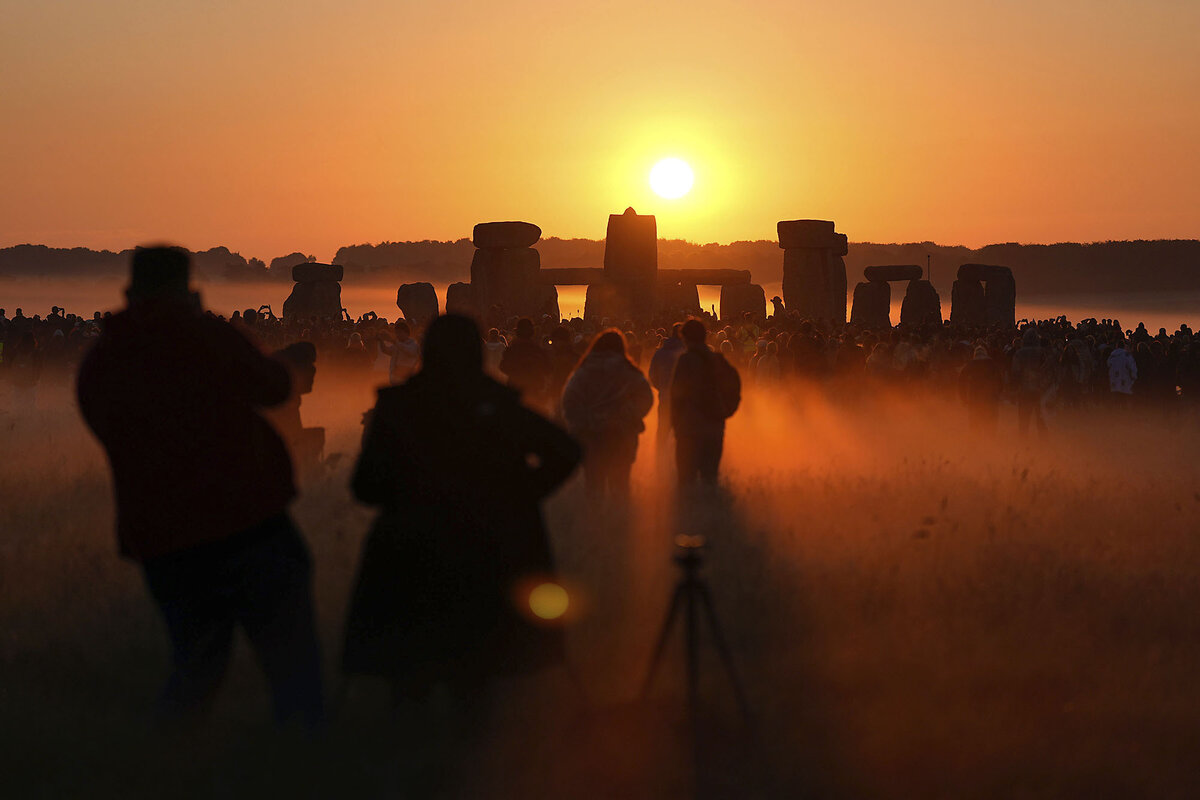The 21st century has seen a steady expansion of U.S. gun rights. On Friday, the Supreme Court walked back a controversial ruling from two years ago that had confounded lower courts.

Why is Christian Science in our name?
Our name is about honesty. The Monitor is owned by The Christian Science Church, and we’ve always been transparent about that.
The Church publishes the Monitor because it sees good journalism as vital to progress in the world. Since 1908, we’ve aimed “to injure no man, but to bless all mankind,” as our founder, Mary Baker Eddy, put it.
Here, you’ll find award-winning journalism not driven by commercial influences – a news organization that takes seriously its mission to uplift the world by seeking solutions and finding reasons for credible hope.
Explore values journalism About usMonitor Daily Podcast
- Follow us:
- Apple Podcasts
- Spotify
- RSS Feed
- Download
 Amelia Newcomb
Amelia Newcomb
The Supreme Court is ending its term with a flurry of consequential decisions. Our lead story offers insight on United States v. Rahimi, a Second Amendment gun rights challenge that the justices ruled on today. You can find updates on other cases in our news briefs.
And don’t miss our report from Haiti. It echoes a phenomenon you find in many areas torn by conflict: a persistent commitment to educating the rising generation, no matter what. Even amid gang violence, street fighting, and displacement, Collège Florian Ganthier is doing everything it can to connect young people with books and lessons that will point the way to a brighter future.
Already a subscriber? Log in
Help fund Monitor journalism for $11/ month
Monitor journalism changes lives because we open that too-small box that most people think they live in. We believe news can and should expand a sense of identity and possibility beyond narrow conventional expectations.
Our work isn't possible without your support.
Today’s stories
And why we wrote them
( 7 min. read )
Today’s news briefs
• Water dispute: The U.S. Supreme Court has rejected a settlement over the management of the Rio Grande. The 5-4 decision rebuffs an agreement recommended by a federal judge over how New Mexico, Texas, and Colorado must share the water.
• Foreign income tax: The U.S. Supreme Court, in a 7-2 ruling, preserved a tax on Americans who have invested in certain foreign corporations as constitutionally sound.
• Columbia University: Dozens of pro-Palestinian student protesters arrested in April after occupying a campus building had all criminal charges dropped.
• Ukraine: Rolling blackouts have grown as Russia has intensified strikes targeting energy infrastructure, raising concerns about meeting national demand when the cold season returns.
• Armenia recognizes Palestinian state: Israel summoned Armenia’s ambassador for what the Israeli Foreign Ministry described as a “severe reprimand.” Dozens of countries have taken this step, though none of the major Western powers has done so.

( 6 min. read )
Nonbelligerents in war often pay a very high price in the violent disruption of their lives. In Lebanon, the children, perhaps, can be entertained and distracted in the moment, but adults are all too aware of the value of what has been lost.
( 7 min. read )
Haiti has dealt with decades of political turmoil and natural disasters. Although there hasn’t been an uninterrupted academic year since 2017, schools here embody hope for a stabler future.
Podcast

It’s much bigger than Caitlin Clark: Our writer tallies women’s recent gains
A star hooper’s arc from college to helping elevate the women’s pro game is one small measure of broader progress. Two years after leading a deep report on Title IX’s 50th anniversary, a Monitor reporter updates us on each of the three braided strands in that legislation’s legacy.
Title IX at 50 Plus Two
Essay
( 3 min. read )
The long, languorous days of this season may just be the ideal time to revisit childhood memories of summers past. As our essayist discovered, simple pleasures never go out of style.
The Monitor's View
( 2 min. read )
On June 23, women who are trained to invent, build, and fix today’s technology will celebrate International Women in Engineering Day. Started in Britain a decade ago, the celebration – and that is the main point – has since gone global. And for good reason. The number of women researchers in all technical fields worldwide is approaching parity with men.
A new study by a Dutch scientific academic publishing company, Elsevier, found that women were 41% of researchers in 2022 compared with 28% in 2001. In a few fields such as chemistry, as well as in a few countries such as Portugal, women have already reached parity. And the most experienced female researchers have their scholarly work cited in publications more often than male researchers do.
The annual celebration for women in engineering began in 2014 as a way to shift the narrative about the difficulties women face in research institutions traditionally dominated by men. “By nurturing and promoting positive role models, we can create a future where the barriers we faced no longer exist,” Dawn Childs, recent president of Britain’s Women’s Engineering Society, told The Manufacturer.
“By shifting the conversation away from the negatives of being a woman in engineering, we can redirect our focus towards the immense potential we possess to make the world a better place through our problem-solving abilities,” she said.
This upward trajectory for women in research has required more than fighting gender bias. Women have become adept at networking to learn the ropes and climb the career ladder. They are figuring out ways to navigate the first several years in research, work-life balance, and scholarships. After one workshop in Singapore for women in science and technology, one participant said she discovered “more about myself and how to communicate with the partners around me.”
As the gender gap narrows for women in research, many in their fields recognize that innovation relies on a broad concept of diversity beyond gender balance. A work environment that includes many unique perspectives and experiences helps foster innovation, as shown by a 2017 study by Boston Consulting Group. A yearly event to celebrate the advances of one particular group – women engineers – opens doors for others.
A Christian Science Perspective
Each weekday, the Monitor includes one clearly labeled religious article offering spiritual insight on contemporary issues, including the news. The publication – in its various forms – is produced for anyone who cares about the progress of the human endeavor around the world and seeks news reported with compassion, intelligence, and an essentially constructive lens. For many, that caring has religious roots. For many, it does not. The Monitor has always embraced both audiences. The Monitor is owned by a church – The First Church of Christ, Scientist, in Boston – whose founder was concerned with both the state of the world and the quality of available news.
( 1 min. read )
In seeking healing through prayer, we can move past blocks and be free of heavy burdens.
Viewfinder

A look ahead
Thanks for being part of the Monitor community this week. Come back Monday, when Howard LaFranchi will report from a Ukrainian village once occupied by Russian forces, where resident Staryi Saltiv straddles two outlooks: hope for a better future and trepidation that Russian troops could return.
And we’ll leave you with a bonus read: Hawaii is the latest place where youth-led activism is resulting in new efforts to tackle climate change – a trend known to Monitor readers from our Climate Generation series.






